|
|
|
Sort Order |
|
|
|
Items / Page
|
|
|
|
|
|
|
| Srl | Item |
| 1 |
ID:
111918
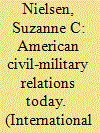

|
|
|
|
|
| Publication |
2012.
|
| Summary/Abstract |
Fifty-five years after it was first published, Samuel Huntington's The soldier and the state remains an essential starting point for serious discussions of American civil-military relations. In part this is due to the boldness and ambition of the author. Huntington brought theory to a research area that had suffered from too little theorizing and then went on to formulate concepts that scholars and practitioners of civil-military relations still find useful. These include: the conceptualization of the military as a profession; the articulation of the two central forces shaping the nature of military institutions as the functional and the societal imperatives; and the formulation of subjective and objective control as the two main patterns of civilian control. This review article briefly revisits these concepts and argues that they retain utility in illuminating important issues in American civil-military relations today. It also argues, however, that Huntington's contributions were productive but not perfect. Some of his specific definitions, such as the content of military expertise, are debatable. Some of his central concerns, such as whether the United States could sustain a strong military over an extended period of time, are no longer central today. Finally, in some places the literature has moved beyond what Huntington offered. The best example is the ongoing debate over how the country's political leaders and its most senior military officers should interact. It is precisely on this point that Huntington's objective control is the weakest. While The soldier and the state certainly does not deserve uncritical acceptance, it does continue to merit a fair hearing. Current discussions of American civil-military relations are likely to be more reasonable and productive if Huntington is given a voice.
|
|
|
|
|
|
|
|
|
|
|
|
|
|
|
|
| 2 |
ID:
181159
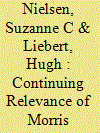

|
|
|
|
|
| Summary/Abstract |
In the current strategic environment, Morris Janowitz’s The Professional Soldier deserves renewed emphasis, especially from the military’s senior leaders who are responsible for the education and development of the country’s officer corps. Janowitz’s work is an especially valuable guide to the education of officers today because of his focus on the need for military officers to understand the political impact of military posture and military operations. The education of U.S. military officers to meet the country’s national security needs in the 21st century must go beyond Huntington’s formulation of expertise to an appreciation, in Janowitz’s terms, of “the political and social impact of the military establishment on international security affairs” across the spectrum of conflict. Janowitz’s formulation is the better guide because military means serve political purposes, and ultimately, a country’s strategic success will be judged in political terms.
|
|
|
|
|
|
|
|
|
|
|
|
|
|
|
|
| 3 |
ID:
114500
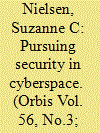

|
|
|
|
|
| Publication |
2012.
|
| Summary/Abstract |
This article argues that the United States government should be acting rapidly to decrease the risks the country is running in cyberspace. While the private sector has a critical part to play in enhancing the country's cybersecurity posture, the government also has a necessary role. It is on the government's role that this article focuses. The article begins by discussing the characteristics of cyberspace. Next, the challenge of cybersecurity is explored through a risk management model that addresses, in turn, threats, vulnerabilities, and potential consequences. Finally, the article lays out some of the characteristics of an effective government response, which help to illuminate a few of the strategic and organizational challenges that will have to be overcome to improve the country's security in the cyber realm.
|
|
|
|
|
|
|
|
|
|
|
|
|
|
|
|
| 4 |
ID:
078240
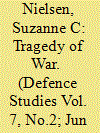

|
|
|
| 5 |
ID:
188797
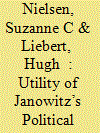

|
|
|
|
|
| Summary/Abstract |
In the pages of this journal, Damon Coletta and Tom Crosbie published a response to our article entitled, “The Continuing Relevance of Morris Janowitz’s The Professional Soldier for the Education of Officers.” In that article, we argued that Janowitz’s emphasis on the need for political awareness in the U.S. military should receive greater attention in the education of today’s officer corps. Coletta and Crosbie suggest that we are too ready to abandon Samuel Huntington’s classic work, The Soldier and the State. In this continuation of that dialogue, we respond with three clarifications and three substantive disagreements. Huntington and Janowitz offer divergent perspectives on the issues of officer education and “political virtue,” we suggest, and Janowitz’s perspective deserves greater weight that it has traditionally received. Coletta and Crosbie also place greater emphasis on the separability of political and military affairs than is warranted, and Janowitz is more helpful here as well.
|
|
|
|
|
|
|
|
|
|
|
|
|
|
|
|
|
|
|
|
|